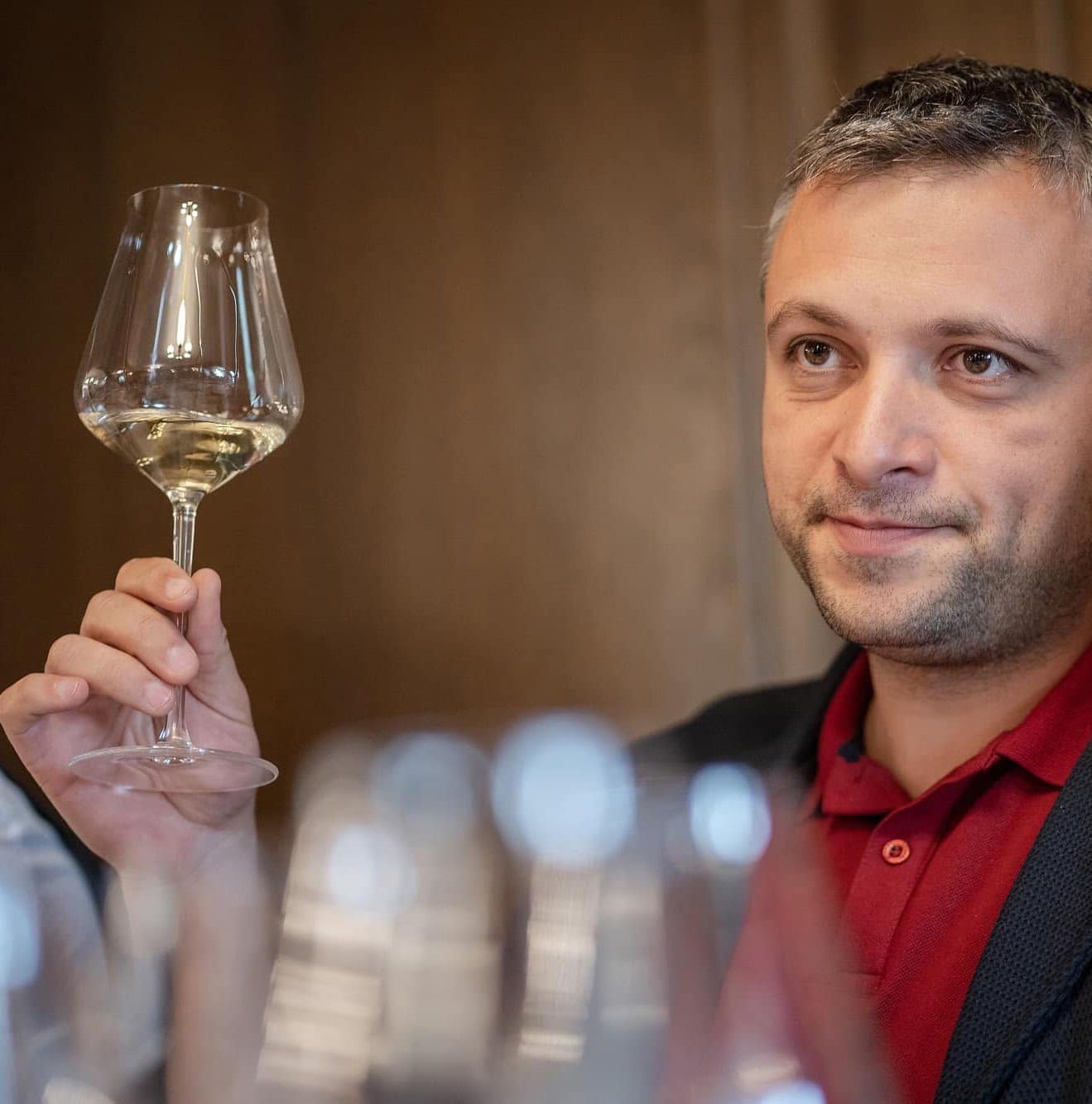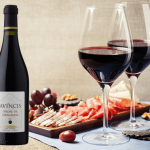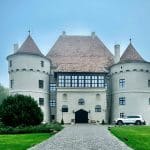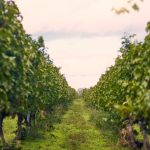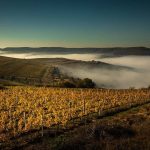Gabi Lacureanu s undoubtedly one of the peaks in his generation of young oenologists. He delighted us, over time, with memorable and internationally recognized wines from Basilescu or Licorna, he became one of the most respected winery consultants in Dealu Mare and launched his own wine collection in Valea Calugareasca . The next time you go to a party at Gramofon Wine, it’s good to know that he’s the man you don’t (much) see, but he’s behind every bottle..
Gabi Lacureanu, the professional
WoR: How many wineries do you currently have in your portfolio?
G.L.: About four… and a half. Gramofon Winery, Licorna Winery, Casa Stanca, Crama Bratu and we also started a collaboration with Ferma cu Midgali. You also know what life is like in the free-lancer business. It’s healthier, you have flexibility, if a contract doesn’t work out, give it up and sign another… A job, no matter how well paid, also means dependence, means less freedom.
WoR: Somehow, for you a winery is just a winery… You grow grapes, you pick them, you make wine, obviously with thousands of steps and decisions along the way. But Gramofon Wine is a place that seems special, it is surrounded by its trademark bohemian air, a lust for life, a Dionysian context… How do you see this from your point of view?
G.L.: I don’t know exactly how to evaluate this. I also noticed it, in the way Marcel Vulpoi appears in the media, that he emphasizes this aspect. I think there would be a lot more to add, even to underline, from the unseen life of the winery, from the efficiency decision to the artistic component that the making of a wine entails. I would prefer there to see a balance between the components of the winery life. We are a few professionals here.
We have an excellent winegrower consultant, Ovidiu Cojocaru, who is a colleague of mine, who takes care of the entire plantation and comes with a lot of know-how, both in terms of cost efficiency, works efficiency, and growth in quality of the grapes – because at Gramofon there are two spots, two vineyards, Mocesti and Pleasa. In Mocesti there are 10 hectares of Chardonnay, in Pleasa there are 15 hectares with a diversity of varieties, the ones you can find in the Gramofon portfolio – Feteasca neagra, Merlot, Sauvignon blanc, Muscat Ottonel, Feteasca regala.
When every act of creation contains a part of the ‘musician’s’ soul
WoR: What do you like about Gramofon Wine?
G.L.: The evolution was interesting. From the time when they sold 80% of the grapes and processed only 20%, because there were no production capacities, they ended up processing 100% at this moment, in their own winery. We are talking about a constant expansion and accessorization, about linking the flows – up to and including the sales. What happens at the winery matters a lot, the bohemian atmosphere, the presentation and tasting events, the parties, but also what happens in Bucharest, at The Great Hill wine bar or the Bragadiru Palace.
Another thing that differentiates Gramofon from other players on the market is the fact that they have, in the Mocesti vineyard, five different clones of Chardonnay. And so, in the winemaking process, you play with the grapes and bring together research issues and artistic ones, and the two sides are beautifully combined.
WoR: That actually being the part you like the most…
G.L.:It’s nice to have oaked Chardonnayand floral Chardonnaysand rounded by battonage or fresh Chardonnays … plus the blends between the various types of Chardonnay, for New World wines, for traditional French-style wines… There is also something else that comes into play – even if each style of winemaking would produce a wine specific to the place, according to that winemaking style, obviously, when you blend the wines, including by blending grapes from different clones, you get unique wines.
WoR: Also the Feteasca neagra wines from Gramofon are special…
G.L.: Yes, and ever since the very beginning, because the first Feteasca neagra that reached the market… I don’t even know what to call it… how to say it so it doesn’t sound bad…
WoR: An accident?
G.L: Not even an accident. No one even thought that there would be that wine…
WoR: You are talking about the late-harvest one, right?
G.L.: Yes, late harvest. Except that it was not harvested late by virtue of an idea, or concept. The grapes were already sold – it was during the time when part of the grape production was still being sold – and the customer did not come to pick up the grapes. And we hesitated to vinify them. Marcel Pascu, the one in charge of the winery, said that it is worth trying to produce a wine that is as dry as possible. Except that the alcoholic potential of the grapes was already 18% or more. As expected, the fermentation stopped around 16%, the yeasts died. And I thought it was an extraordinarily good wine, just the way it was…. Similar to some special wines, like a Chateauneuf du Pape or Amarone. Not necessarily technically, but as characteristics. I suggested we leave it that way, convinced that it would be a great success, and indeed it was a great success. After this wine, we started doing things by schedule, we knew what and when we had to harvest but… the year doesn’t always help you.
WoR: Since we came upon this subject, how does it look for this year?
G.L.: I think that 2022 was a normal year for all of the Dealu Mare region. Last year was special, with more rainfall than you would expect in such an area. But now we had an average year, with drought and a bit of rain around the harvest, with the same temperatures, the same number of sunny days, with a normal evolution of the grapes and a moment of picking in the waiting area. There are obviously variations, because the plots on the edge of the vineyard have slightly different conditions than those in the center, but, on average, we are talking about a normal year. With the history we had behind us, we were prepared for everything, so that the grapes don’t spoil, especially since the harvest, compared to last year, is 30% lower.
WoR: But this usually translates into good wines, if the losses are not caused by hail or other catastrophes…
G.L.: Yes, it translates into better wines. But also at higher costs! The quality, indeed, will be special. The aromas of white and rose wines will have many sweet notes due to the drought and the small variations in overnight and daytime temperatures. In red wines, on the other hand, the pigments are very concentrated, which is already visible at this moment. Both Feteasca neagra and Merlot, just recently crushed, are already purple. The compounds that bring out the flavors are also very present.
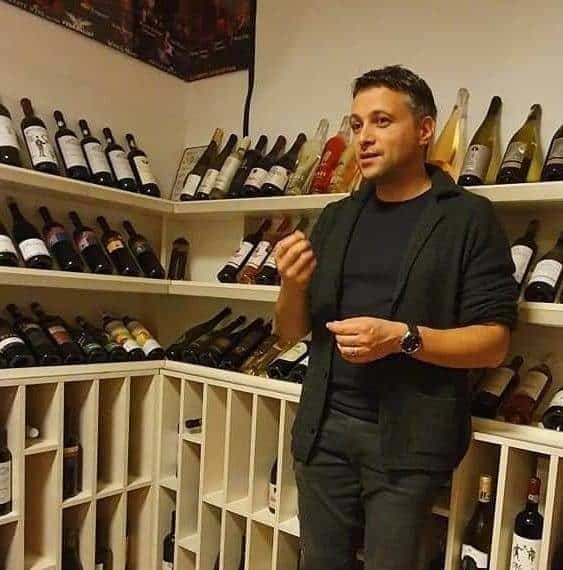
Music of the wine – Beginnings with Gabi Lacureanu
WoR: We found out what the present is like, let’s go back a bit to the beginning. How did you end up working with Gramofon Wine?
G.L: The relationship started with Marcel Pascu… I was working at Basilescu and, on the way to work, I met, at a newsstand, a colleague from Iasi, Valentin Sturzu, who had worked as a winegrower at Videlmar, if you remember the large complex in Urlati, near the hospital – the name Videlmar came from Vin de Dealu Mare. We were colleagues in college, and I quickly convinced him to come and work with me at Basilescu. There, he was accommodated in Farm 5 or 6, I don’t know what number it was, it is certain that it was the farm that Marcel Pascu bought. And Valentin lived in the farm headquarters, a sort of small mansion. Then I found out that Marcel Pascu also bought that building, and the lands next to it, and the „cultural meetings” building and… since he bought them, he also launched a vineyard reconversion process, and started to make some wine… And when it came to wine, Valentin told him that he would bring in a fellow oenologist from Basilescu… And that’s how we started a relationship.
Absolutely all the wines from Gramofon, better or worse, passed through my hands – their quality was an attribute a bit independent from me and a bit more related to the existing processing infrastructure, at that moment. At that time, I made voluntary recommendations, I supported the producers without any profit. It seemed normal to do what I was doing for free, since I had a fellow winegrower staying there for free. And Mr. Pascu decided to consult other oenologists, who also shared their opinions, and things did not go that well, so he called me back.
I realized that unpaid work cannot be properly appreciated, so I continued to be a consultant, this time with a contract. And things started to go well, with my recommendations, and suddenly there was no need for another opinion, and even the wines turned out better. Marcel Pascu was not making money from wine at that point, he was not selling wine.
The first winery name and the first brands didn’t really catch on with the public, so, after he capitalized a little more and started processing more, so it was obvious that we need to seriously boost sales, I suggested the Gramofon and Virtuoz brands – as I am also deeply connected to music. Gramofon (en.Gramophone) because it is the instrument that plays a high-class musical opera, Virtuoz (en. Virtuoso) because it is the most excellent interpretation of an opera. Both names were born from the way I saw Marcel Pascu – a man who did this every day, transmitted a great opera to the public, and did it in excellence.
Coda – period. And from the beginning again.
So the relationship I have with Gramofon Wine is, in fact, much deeper than it shows to the naked eye. It didn’t all happen on the first day, but working there, in that winery, on that land, you connect in a different manner to the place and the time of that place…

